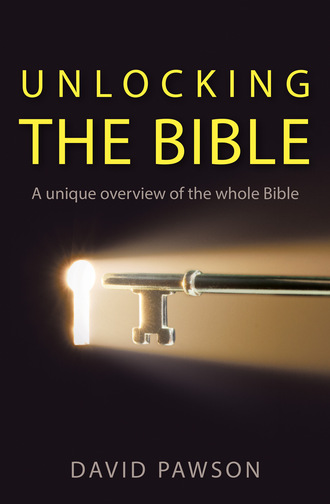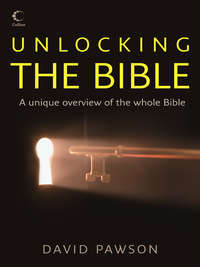
Полная версия
Unlocking the Bible
3. IDOLATRY
Canaan was full of idolatry. There was occultism, superstition, astrology, spiritism, necromancy, and fertility cults. They worshipped ‘Mother Earth’, believing that sexual acts had links with the fertility of the land. In the pagan temples there were male and female prostitutes, and worship included sex. These practices were reflected in the monuments throughout the land: asherah poles (phallic symbols) were frequently seen on the hills as a witness to the pagan rituals which predominated.
Deuteronomy makes it clear how God viewed such behaviour. It was his land and it was now totally corrupt, defiled, debased. It was disgraced and God could not let it go on. Are things so different now?
The last work of Moses
Deuteronomy is the last of the five books of Moses, the Pentateuch. We have seen that it was written at a critical moment for the people of Israel. They were about to enter the Promised Land, but Moses was not going to lead them. He was by then an old man of 120, and was entering his last week of life (the book ends with his death). Having seen the weakness of the present generation’s parents, he was afraid that they might go the same way. He saw ahead to the battles they would need to fight, both physical and spiritual.
In the last week of his life he spoke three times to them. The whole of Deuteronomy is made up of three long speeches, each of which must have taken the best part of a day to give. This spoken style comes across. It is a very personal and emotional book. Moses is appealing to the people, like a dying father to his children.
It is quite likely that during these last six days of the last week in Moses’ life he spoke and wrote on alternate days. On days 1, 3 and 5 he gave these discourses, then on days 2, 4 and 6 he wrote down what he had said the previous day. He handed what he wrote to the priests, who placed it alongside the ark of the covenant, so that the people would never forget. This is his ‘last will and testament’, the greatest prophet of the Old Testament bringing the Word of the Lord to his people.
The book can be neatly divided into the three parts.
1. Past: Recollection (1:1–4:43)
a. faithlessness condemned (1:6–3:29)
b. faithfulness counselled (4:1–43)
2. Present: Regulation (4:44–26:19)
a. love expressed (4:44–11:32)
b. law expanded (12:1–26:19)
3. Future: Retribution (27:1–34:12)
a. covenant affirmed (27:1–30:20)
b. continuity assured (31:1–34:12)
First Discourse (1:1–4:43) Past
In the first discourse, Moses looks back to the days after Sinai when God had made the covenant with his listeners’ parents. He reminds them that although it only takes 11 days to walk from Sinai to the Promised Land, their parents took 13,780. When they arrived at Kadesh Barnea on the border, they paused and at God’s instruction sent one man from each of the tribes to spy out the land. The spies were positive about the quality of food in the land, but not about their chances of conquering it. The people were too big and the towns impregnable, they said. Only two, Joshua and Caleb, urged the people to trust God and go on.
Israel had everything in front of them and yet their morale failed. Although God had been faithful to them, they were faithless. The message of Chapter 4 is simply this: ‘Do not be like your parents. They lost their faith and they lost the land. If you keep yours, you can keep the land.’
Second Discourse (4:44–26:19) Present
The legislation in the second part is not as easy to read. It is by far the longest section, probably given on the third day of that last week in Moses’ life. It outlines the way the Israelites must live if they are to remain in the land God is giving them.
Summary
Chapter 5 Moses begins with the basic principles of God’s righteous way of living, his upright way of living, namely the Ten Commandments. These are all about one thing, respect. Respect God, respect his name, respect his day, respect your parents, respect life, respect marriage, respect property, respect people’s reputation. The quickest way to destroy society is to destroy respect.
It is very interesting to draw a contrast between the law of Moses and the laws in pagan society. If you contrast the standards in Moses’ law with the worst practices of pagan society, as we have already done with the Amorites in Canaan, it is obvious what a pure, holy law is given in the Ten Commandments.
Chapter 6 The covenant law is expounded and expanded. We are told the purpose for the law: it is so that love can be communicated from one generation to the next.
Chapter 7 They are commanded to abolish all idolatry (i.e. the First Commandment) and exterminate the Canaanites, that they may not be led astray.
Chapter 8 They are encouraged to remember with gratitude God’s dealings with his people. They are warned not to forget, especially when prosperity comes.
9:1–10:11 Moses reviews the sin and rebelliousness of the people. They are warned not to become self-righteous.
10:12–11:33 The theme in this section is obedience. If they are obedient they will be blessed; if they are disobedient they will be cursed – the choice is theirs. This is an emphasis throughout the book. The word ‘hear’ comes 50 times and the words ‘do’, ‘keep’ and ‘observe’ 177 times.
Alongside this, it is important to know that another common word in Moses’ exposition is ‘love’. It is used 31 times. If you love the Lord you keep his laws. In the New Testament Paul says that love is the fulfilling of the law. It is not a matter of legalism, but a matter of love. To love is to obey, because in God’s sight love is loyalty. It means staying true to someone. Love and law are not opposed to one another – they stand together.
Chapters 12–26 A huge amount is covered in these chapters, sometimes in amazing detail. In this section of his speech Moses passes from the general to the particular, from the vertical (our relationship with God) to the horizontal (our relationship with others).
Contrasting standards
We can best observe these laws against a background of contrasts. What was so different, so special, about the law of Moses compared to other societies in the region?
1. STANDARDS IN THE PROMISED LAND
We have already seen how the laws in Deuteronomy are a mirror image of what was taking place in the land at that time. Some of the more puzzling laws relate to the practices of those already occupying the land.
2. STANDARDS IN NEIGHBOURING LANDS
There is also an interesting comparison to be made between the law of Moses and another law which has been discovered from the ancient world, the code of Hammurabi, an ancient Amorite King of Babylon (or Babel). These laws were written 300 years before Moses. They include prohibitions on killing, adultery, stealing and false witness. Furthermore, the famous law of lex talionis, or the law of revenge (‘an eye for an eye and a tooth for a tooth’), is also included. All this should not surprise us. In Romans the apostle Paul says that God ‘has written his law on the hearts’ of pagans. He did not just write it on stone – he has written it into the hearts of people so that everyone knows that certain things are wrong. For example, every society in the world has always thought incest was wrong.
There are, however, some big differences between Hammurabi’s law and the law of Moses. There was just one punishment for any wrong done, and that was death. In the law of Moses the death penalty is quite rare. There are only 18 things in the law of Moses that deserve the death penalty. By comparison to Hammurabi’s law, the law of Moses is not nearly so harsh.
Another huge difference is that in the law of Moses slaves and women are treated as people, whereas in the law of Hammurabi they are treated as property. Women have none of the rights and respect in the law of Hammurabi that they possess in the law of Moses.
The law of Hammurabi also includes class distinctions. There are nobles and common people, and a different law applies depending on the class. In the law of Moses there is no such thing as class. The same law applies to everybody.
A final point to note is that the laws of Hammurabi are casuistic laws – they are presented in the form of conditions. ‘If you do this, then you must die.’ The laws of Moses are presented in what is called an apodeictic manner – not as conditions, but as commands. ‘You must not do this.’ The laws of Moses reflect God’s right as king to say what should be. He makes commands because he sets the standard.
The commands and legislation fall into a number of different categories, detailed in the following sections.*
1. Religious/ceremonial
IDOLATRY/PAGANISM








FALSE SPIRITUALISTS




BLASPHEMY

DEDICATIONS

TITHING

CONQUEST



SABBATH

FEASTS (ALL PILGRIM EVENTS)



SACRIFICES AND OFFERINGS

EXCLUSIONS FROM THE ASSEMBLY




VOWS

SEPARATION



These laws of separation may seem very strange, but they were connected to the old fertility cult which was widespread in the land. The pagans believed that by mixing such things they were producing fertility. God was emphasizing that he gives fertility: they did not need to practise such superstition.
2. Government
KING
There are laws here for a king, even though they were not to have a king for centuries.



JUDGES




3. Special crimes
AGAINST PERSONS



AGAINST PROPERTY

4. Personal rights and responsibilities





5. Sexual relations




6. Health




This last point is a law which has been misunderstood by almost every Jew: ‘You shall not boil a kid in its mother’s milk.’ On the basis of this one verse the Jews have erected a ‘kosher’ system of diet whereby they have (effectively) two kitchens with two completely different sets of pots and pans and sinks to wash them in – in order that dairy products are kept separate from meat products, which Abraham never did, offering veal and butter to his visitors. They have totally misunderstood the purpose of the law, which once again was connected to a rite of the pagan fertility cult. The Canaanites believed that cooking a kid in its mother’s milk caused it to have incest with its mother, which then promoted fertility.
7. Welfare





